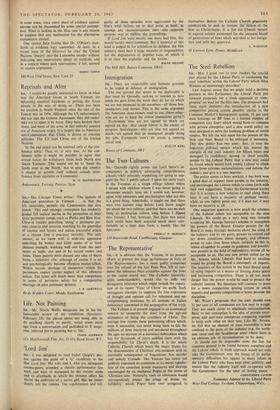The Steel Rebellion
SIR,—May 1 point out to your readers the crucial part played by the Liberal Party in awakening the steel 'rebellion' within the Labour Party which Alan Watkins so interestingly describes?
Last August. aware that we might hold a decisive position in this Parliament, the Liberal Party put forward proposals for a fresh approach or 'com- promise' on steel for the first time. The proposals had three main elements--the introduction of a new competitive pricing system possibly similar to. the Common Market's basing-point system. 51 per cent, state holdings on BP lines in a limited number of companies (say four) which would have to compete. with private enterprise, and a new world policy on steel designed to solve the looming problem of world surplus. We left the way open- for the powers of the Iron and Steel Board to be enlarged if necessary. This new policy had two aims: first, to stop the ludicrous political seesaw which has wasted the energies of the steel industry for fifteen years and damaged its confidence; second, to show sensible people in the. Labour Party that a new way could be found which would both enable Labour to climb- down from -extreme nationalisation, and reform the industry and give it a new impulse.
The policy seems to have worked; it has both won a good deal of support from people in the industry, and encouraged the Labour rebels to come forth with. their own suggestions. Today the Government knows that if it accepts a new solution in steel along these lines it can have a majority of perhaps twenty, while, as you rightly point out, if it does not, it may have no majority at all.
One important question is how much the schemes of the Labour rebels are acceptable to. the nine Liberals. We could go a very long way towards accepting Mr. George Strauss's scheme to strengthen the powers of the Board. Greater powers for the Board to make strategic decisions about the siting of the industry and its ore ports, powers to control and lay down conditions about mergers, and ultimate power to take over firms which. unlikely as this is, refuse altogether to accept its guidance. and possibly new powers in the field of redundancy, would all be acceptable to us. The one new power called for by Mr. Strauss which Liberals find hard to swallow, would be giving the Board a monopoly of imports.. The inspirers of this notion in the Steel Board speak
of using imports as a means of forcing down prima' and increasing competition. There is all too much danger that the power would be used to protect the industry instead. We therefore will continue to press for a more competitive pricing system in which imports and genuine competition at home provide the discipline.
Mr. Wyatt's proposals that the state should own 51 per cent of all companies are less easy to accept.
They are much closer to wholesale nationalisation.
Basic to our conception is the idea of private enter- prises and part-state enterprises competing together'
to keep each other on their toes. Like Mr. Strauss, we feel that an element of state ownership is best confined to the parts of the industry (e.g. the north- east coast and the Scunthorpe area where there is an obvious job of rationalisation to be done.
It should not be impossible none the less for common ground to be found between ourselves and
the Labour rebels. A fresh approach would not only take the Government over the hump of its parlia- mentary difficulties but appeal to many others in the Labour Party who have kept silent publicly, and ensure that the industry itself will co-operate with' the Government for the sake of lasting peace.
CHRISTOPHER LAYTON
Economic Adviser to the Liberal Party Wes? End Cottage, Fosham, Chippenham. Wilts.


































 Previous page
Previous page